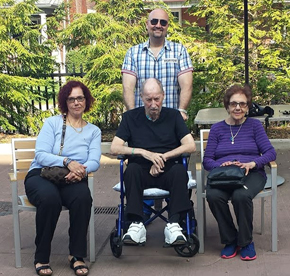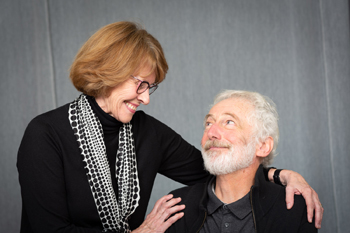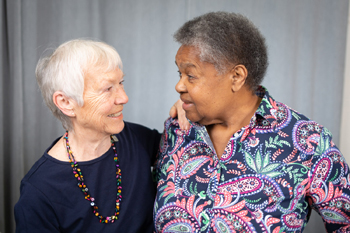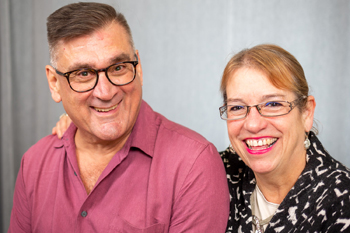Families provide crucial support in diabetes care

By Mary Dickie
November is Diabetes Month, and this year the focus is on The Family and Diabetes. We asked some of the patients who receive care and services through the St. Michael’s Diabetes Comprehensive Care Program to tell us about their experiences with diabetes, and the family support systems that help them manage the disease.

John and Frances Speakman
“I was 50 when I was diagnosed,” says John Speakman, 70, whose family support is provided by his wife, Frances. “I was denying it. But I had lost about 30 pounds, and I was a walking skeleton, and I was scared. At work, word was going around that I had cancer or AIDS, so I went to my GP and was immediately sent to St. Michael’s. I’ve now been seeing Dr. Amir Hanna at St. Michael’s for 20-odd years. The diabetes clinic is not a scary place, it’s nice and friendly and there’s quite a lot of laughter. It’s very comforting to see the familiar faces.”
Speakman says his experience improved dramatically a few months ago, when he started using the Dexcom continuous glucose monitor.
“It’s astonishing,” he says. “It all works through my phone, and there’s an alarm like a French police car if my levels drop. It certainly gets my attention, and it links to Frances’s phone, so she never has to worry.”
“It’s changed our lives,” adds Frances. “It gives me more freedom, because I worry that he might get low blood sugar when I’m not there. It will ping me, and by the time I call, he’s already taken steps to deal with it. John has always been good at taking care of himself, watching what he eats, exercising and keeping track. I never really had to worry until earlier this year, when he had a hypoglycemic incident that required emergency medical care. It was frightening, but now, with the alarm, it’s given me peace of mind.”

Elaine Smith (r) and Sandra Fishleigh
Elaine Smith, 79, whose family support is her partner, Sandra Fishleigh, says she was diagnosed with diabetes at 23. “It was not a surprise, because there are people with diabetes on both sides of my family,” she says. “I never considered it a major debilitating condition, it was just a fact that I had to live with. St. Mike’s is wonderful, the staff are very supportive and helpful, and I’ve been able to make use of all of their services over the years.”
Things changed for Smith about 15 years ago, when she became blind. “It was horrific for a while,” she admits. “There’s a grieving that happens when you lose something, your sight or a limb or whatever, and I was not prepared for that.”
That’s when Fishleigh went from being an observer in Smith’s care to an active participant. “My role has changed a lot through the years,” she explains. “When Elaine first started on insulin, I was just a witness, it was Elaine’s issue, and she managed it. I mean, I supported things around meals and not having desserts and that kind of thing, but she was in charge. She also has Parkinson’s now. So with Parkinson’s and blindness, my role changed. I do the measuring of the insulin and the blood sugar. I see myself as actively involved in the care of diabetes, whereas before I was an observer.”
“Sandra is my partner, she guides me not just through diabetes, but through my life,” adds Smith. “She helps me to get from point A to point B and describes everything to me. She’s my right hand.”

Michael and Cynthia Homonylo
Michael Homonylo, 62, discovered he had diabetes after he had a fainting spell while driving when he was about 25. “I went to my doctor, who sent me for tests and told my wife, Cynthia, to get some medication into me as soon as possible,” he says.
Homonylo admits it hasn’t been easy to get his diabetes under control. “Cynthia had to call 911 on a couple of occasions when I was not following a regimen or controlling it properly,” he says. “I guess I felt invincible. Since then I’ve been learning to pay better attention to it. I’m also an alcoholic, and that was a contributing factor, I think. I signed myself into rehab June 8, 2011, and I haven’t had a drink since.”
Homonylo says he is steadily learning how to manage his diabetes, with the help of the St. Mike’s team. “My doctor sent me to St. Michael’s diabetes clinic to learn how to count carbs, take blood samples and use the continuous glucose checking device,” he says. “I’m also seeing a chiropodist, and learning to manage my high blood pressure and cholesterol, so I’ve been to a cardiologist and I’m on an exercise program, which is also beneficial. I have nurses and dieticians who have given me pointers on where I’ve made mistakes and how they can happen. I feel really good about it, and I’m indebted to them.”
His family support has also been instrumental in Homonylo’s progress. “My son Gray is a professional trainer, and he’s shown us how to use the machines at the gym to the greatest benefit,” he says. “And Cynthia prepares meals in a different way—with more vegetables and less potatoes, and no fast food. I miss the sauce on a Big Mac every once in a while, but I can live without it.”
“I bought him a Fitbit and told him to get walking!” says Cynthia. “But the team at St. Michael’s are awesome motivators, so I don’t really need to do much motivation. He’s really good at attending the clinic and heeding their advice. I can only be a cheerleader, he’s got to do the work—and he’s doing the work.”
For more information on managing diabetes, check out Diabetes Canada’s new 2018 Clinical Practice Guidelines, which provide information, tools and resources for people with diabetes and their supporters. For information on St. Michael’s Diabetes Comprehensive Care Program, visit http://www.stmichaelshospital.com/programs/endocrinology/clinic.php
About St. Michael’s Hospital
St. Michael’s Hospital provides compassionate care to all who enter its doors. The hospital also provides outstanding medical education to future health care professionals in more than 29 academic disciplines. Critical care and trauma, heart disease, neurosurgery, diabetes, cancer care, care of the homeless and global health are among the Hospital’s recognized areas of expertise. Through the Keenan Research Centre and the Li Ka Shing International Healthcare Education Centre, which make up the Li Ka Shing Knowledge Institute, research and education at St. Michael’s Hospital are recognized and make an impact around the world. Founded in 1892, the hospital is fully affiliated with the University of Toronto.
St. Michael’s Hospital with Providence Healthcare and St. Joseph’s Health Centre now operate under one corporate entity as of August 1, 2017. United, the three organizations serve patients, residents and clients across the full spectrum of care, spanning primary care, secondary community care, tertiary and quaternary care services to post-acute through rehabilitation, palliative care and long-term care, while investing in world-class research and education.
